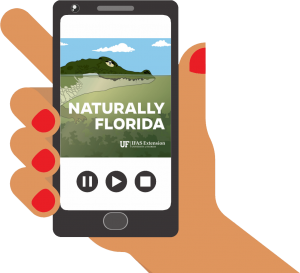The marsh rabbit is a medium-sized rabbit with short, rounded ears, and small feet. It is similar in appearance to the more familiar eastern cottontail rabbit but without the white color of their tail. The marsh rabbit is found in the southeastern United States from southeast Virginia (in the Dismal Swamp), along the east coast to eastern Alabama, and the Florida peninsula and the islands along the coast of Florida. There is a subspecies of the marsh rabbit, which is endangered and only found in (endemic to) the lower Florida Keys. The Lower Keys Marsh Rabbit population has been declining since at least the 1960s because of the loss and degradation of suitable habitats because of human development. Learn all about this subspecies of the marsh rabbit in the latest episode of Naturally Florida.
New Episode from Naturally Florida
Naturally Florida (a podcast about Florida’s natural areas and the wild things that live here) recently released a new episode about the Lower Keys marsh rabbit!
Check it out, below on Spotify, or on your favorite podcast platform.
If you enjoyed this episode about the Lower Keys marsh rabbit, please consider sharing it with a friend.
You can find all the podcast platforms where Naturally Florida is published, submit feedback, or request future topics at www.naturallyfloridapodcast.com
- Learn More:
- Lower Keys Rabbit: https://myfwc.com/wildlifehabitats/profiles/mammals/land/lower-keys-rabbit/
- Lower Keys Marsh Rabbit: https://www.fws.gov/species/lower-keys-marsh-rabbit-sylvilagus-palustris-hefneri
- Marsh Rabbit: https://myfwc.com/wildlifehabitats/profiles/mammals/land/marsh-rabbit/
- This or That? Eastern Cottontail or Marsh Rabbit: https://youtu.be/maFhVuEC6jU
How You Can Help:
- Get involved with your local city or county leaders and elected officials. Advocate for low impact development, green infrastructure and living shorelines where possible.
- Keep your cat indoors and do not support feeding of feral cat populations.
- Practice sustainable tourism when visiting the Florida Keys or anywhere in Florida. Check out Car Free Key West (https://www.carfreekeywest.com/), Florida Green Lodging (https://floridadep.gov/osi/green-lodging), and the Florida Friendly Fishing Guide Certification Program (https://www.flseagrant.org/fisheries/florida-friendly-fishing-guide-certification-program/)
Sources for this Episode:
- Impacts of a half century of sea-level rise and development on an endangered mammal: https://onlinelibrary.wiley.com/doi/10.1111/gcb.12024
- Population Estimation and Monitoring of an Endangered Lagomorph: https://www.jstor.org/stable/41418016
- Lower Keys Rabbit: https://myfwc.com/wildlifehabitats/profiles/mammals/land/lower-keys-rabbit/
Special thanks to Holly Abeels, Sea Grant Agent, Brevard County for assistance in the script writing of this episode.
Learn about other episodes from Naturally Florida by Clicking Here.
University of Florida IFAS Extension is committed to diversity of people, thought and opinion, to inclusiveness and to equal opportunity.
UF/IFAS Extension is an Equal Opportunity Institution.
 0
0


